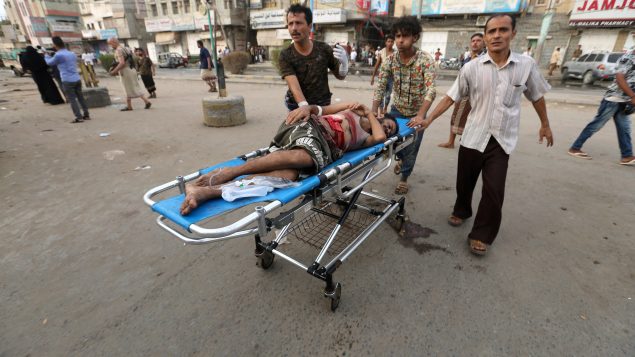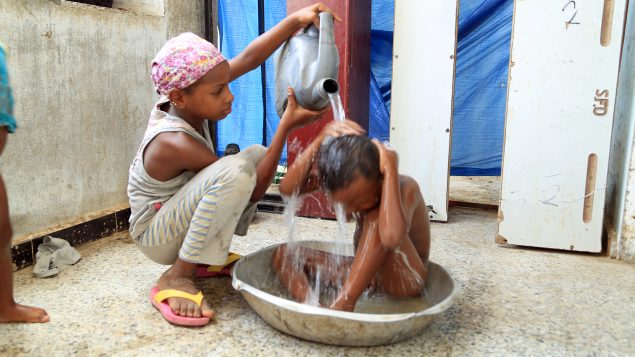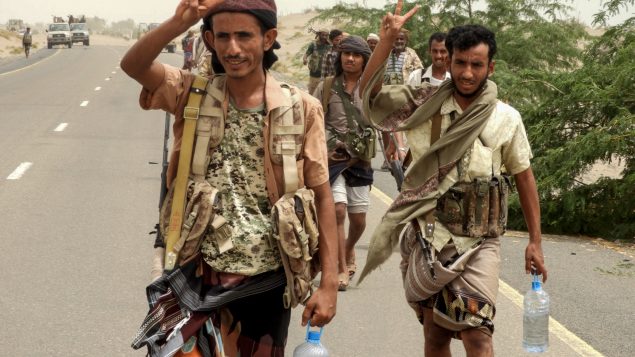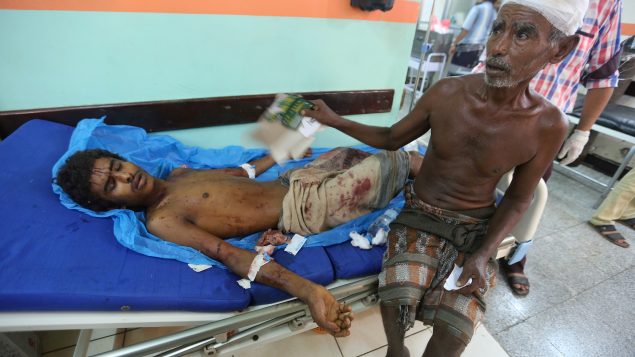Humanitarian aid groups are warning of a dangerous escalation of fighting in the western Yemeni city of Hodeidah that threatens the lives of thousands of children caught in the crossfire of the battle for the country’s main port.
The Houthi rebels who control the city reported Thursday that Saudi-led airstrikes killed 52 people when they struck in the vicinity of the city’s largest functioning hospital.
One strike hit a fish market, next to the al-Thawra public hospital, German news agency dpa reported Thursday.
Shortly after, a second strike hit the gate of the hospital while medics and civilians were taking those injured inside, Youssef al-Hadri, dpa reported citing a spokesman for the Houthi-affiliated Health Ministry.
At least 101 people were injured in the two strikes, the Houthi official added.
Civilians under attack

A man, injured by an air strike at a fish market, is rushed to hospital in Hodeidah, Yemen August 2, 2018. (Abduljabbar Zeyad/REUTERS)
Tamer Kirolos, Save the Children’s Yemen Country Director, who had visited Al Thawrah Hospital where the charity runs a diphtheria centre just days earlier, said they are seriously concerned that the area is simply not safe for civilians and that people seeking help at the hospital may not be safe.
“It is unacceptable that civilians are coming under attack and that people simply walking the streets are getting caught up in this kind of violence,” Kirolos said Thursday. “We strongly condemn any attacks on civilians and call on all parties to the conflict to respect international human rights law.”
Even before the latest increase in violence, an average of 6,238 people—half of whom are children—were fleeing Hodeidah Governorate every single day, according to the United Nations.
Since the beginning of June, when Yemeni government forces backed by the United Arab Emirates (UAE) and Saudi Arabia launched an assault to capture the strategic port city, the constant threat of bombing, shelling, starvation and a lack of basic services has displaced a total of 330,610 people from Hodeidah according to the United Nations.
Hodeidah is the main port for the shattered import-dependent economy, as more than 70 per cent of all humanitarian supplies, commercial goods and food brought into the country, passes through the docks there.
Targeting water infrastructure

A displaced girl pours water on her brother to wash him at a school where they live with their family in al-Marawia near Hodeidah, Yemen July 16, 2018. (Abduljabbar Zeyad/REUTERS)
Aid agencies are also warning of increased threat of cholera and are calling on the Saudi-led coalition to immediately halt the targeting of civilian infrastructure.
“Attacks against civilian facilities and services are unacceptable, inhumane and in breach of the basic laws of war,” UNICEF executive director Henrietta H. Fore said Wednesday.
“Ongoing violence and repeated attacks on lifesaving civilian infrastructure in Hodeidah are a direct threat to the survival of hundreds of thousands of children and their families.”
The UN Children’s Agency accused the coalition of “an escalation in the targeting of systems and facilities that are essential to sustaining the lives of children and families.”
“Two days ago, we received reports that a UNICEF-supported warehouse containing humanitarian provisions, including hygiene and water-related supplies, was hit by two airstrikes,” Fore said.
“On 28 July, a UNICEF-supported sanitation centre in the Zabid District came under attack, damaging the facility’s fuel tank. On 27 July, the water station in al-Mina District, which provides Hodeidah with most of its water, was hit.”
‘No winners’

Yemeni pro-government forces flash the victory gesture as they arrive in al-Durayhimi district, about nine kilometres south of Hodeida international airport on June 13, 2018. ( Nabil Hassan/AFP/Getty Images)
Yemen is already facing a severe shortage of drinking water, which is directly linked to outbreaks of cholera and acute watery diarrhoea, Fore said.
Attacks on water infrastructure jeopardize efforts to prevent another outbreak of cholera and acute watery diarrhoea in Yemen, she added.
The civil war in Yemen between government and Saudi-led coalition forces, who’ve been battling Houthi rebels for control of the country has already cost the lives of more than 10,000 people. More than 22 million people are in need of humanitarian assistance and protection, and more than 8 million people already face the risk of starvation.
“The war in Yemen has no winners,” Fore said. “It is robbing Yemeni children of their futures.”







For reasons beyond our control, and for an undetermined period of time, our comment section is now closed. However, our social networks remain open to your contributions.